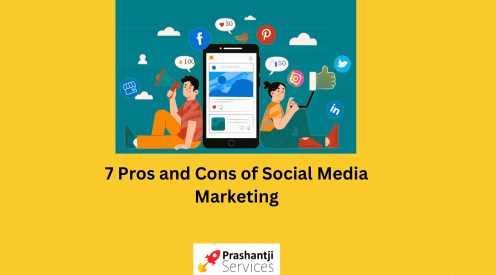In the digital age, social media is more than just a platform for social interaction; it has transformed into a vital tool for marketing and business growth. Companies of all sizes are leveraging platforms like Facebook, Instagram, and Twitter to enhance their brand visibility and engage with a broader audience. While the allure of social media marketing is undeniable, it’s essential to understand both the benefits and drawbacks associated with it. This blog post delves into the seven key pros and cons of social media marketing, providing a balanced perspective that will help businesses strategize more effectively.
Pros of Social Media Marketing

Social media marketing is an indispensable tool in the modern digital marketing arsenal. Here are the top seven benefits of social media in marketing, outlined to help you harness its full potential.
1. Increased Brand Awareness
One of the primary advantages of social network marketing is significantly increased brand visibility. Through regular posting and engagement, social media platforms like Facebook, Instagram, and Twitter serve as powerful tools to broadcast your brand to a vast audience. Engaging content can be shared widely, extending your brand’s reach exponentially. This consistent visibility is crucial for building brand recognition and keeping your business at the forefront of consumers’ minds.
2. Cost-Effectiveness
Social media marketing stands out for its cost-effectiveness. With platforms allowing free account setups and scalable advertising options, businesses of all sizes can leverage this advantage of social network marketing. Whether through organic growth tactics or targeted ads, social media provides a budget-friendly way to promote your business, making it especially beneficial for startups and small businesses that need to maximize every dollar.
3. Direct Customer Interaction
The ability to interact directly with customers is a game-changing pro of social media marketing. This direct line of communication allows businesses to gather immediate feedback, respond to inquiries, and engage customers in meaningful conversations. These interactions not only boost customer satisfaction and loyalty but also provide valuable insights into customer preferences and needs, guiding future business and marketing strategies.
4. Increased Website Traffic
Social media platforms are excellent drivers of traffic to your business website. By strategically placing links within posts and ads, social media can significantly increase the number of visitors to your site. This is vital for boosting search engine rankings and increasing online visibility, making it a key benefit of social media in marketing.
5. Market Insights
The analytic tools provided by social media platforms offer deep insights into your audience’s behavior and preferences. By analyzing this data, businesses can understand what content performs best, which products are popular, and how consumers react to different marketing messages. These insights allow for more informed decisions and tailored marketing strategies, enhancing the overall effectiveness of your business efforts.
6. Targeted Advertising
One of the most significant benefits of social media marketing is the ability to target advertising to specific segments of your audience. Social media platforms offer sophisticated targeting tools based on demographics, geographic locations, interests, and behaviors. This precise targeting helps ensure that your marketing messages reach the individuals most likely to be interested in your products or services, increasing the efficiency and effectiveness of your advertising spend.
7. Competitive Advantage
Maintaining an active and engaging social media presence can provide a substantial competitive advantage. It keeps your brand in the public eye and allows you to stay ahead of competitors by quickly adapting to market trends and customer preferences. Additionally, social media enables businesses to monitor competitors’ strategies, providing insights that can be used to refine your own tactics and seize market opportunities.
Cons of Social Media Marketing

While social media marketing is a key strategy for modern businesses, it comes with a set of significant challenges that can impact its effectiveness. Here are seven drawbacks to consider if you’re planning to leverage social media for business:
1. High Time Investment
Effective social media marketing demands a significant investment of time and resources. From crafting a content calendar and generating posts to engaging with followers and analyzing metrics, every step requires attention and expertise. For small businesses or those without a dedicated social media team, these demands can lead to burnout or neglect of other critical business functions.
2. Exposure to Negative Feedback
The open nature of social media platforms invites all sorts of feedback, which includes negative comments, criticisms, or even unjust attacks. These can come from dissatisfied customers, competitors, or trolls. Managing such feedback professionally is crucial, as poor responses can further harm the company’s reputation and customer relationships.
3. Demanding Content Creation
Keeping an audience engaged requires a constant supply of fresh, relevant, and engaging content. This relentless demand can be a major drain on resources, especially for businesses that lack the content diversity or creative flair needed to stand out on platforms crowded with competitors.
4. Difficulties in Measuring ROI
One of the most frustrating aspects of social media marketing is the difficulty in tracking the return on investment, especially when goals are related to brand awareness or customer engagement rather than direct sales. Many businesses struggle to link social media metrics directly to strategic business outcomes, making it hard to justify ongoing investment in this area.
5. Privacy and Security Risks
Operating on social media involves handling and protecting a considerable amount of user data, which can be a hotspot for privacy issues and security breaches. Ensuring compliance with data protection laws like GDPR and safeguarding against hacks requires robust security measures, which can be complex and expensive to implement.
6. Constant Platform Changes
Social media platforms are known for frequent, often unpredictable changes to their algorithms and user policies. These changes can drastically affect what content is shown to users and how it’s interacted with. Businesses must stay informed and quickly adapt their strategies to maintain visibility and engagement, which can be a distracting and continuous challenge.
7. Market Saturation
With millions of businesses all fighting for attention on the same platforms, the social media landscape is incredibly saturated. This environment makes it difficult to capture the audience’s attention, requiring businesses to invest heavily in advertising or exceptionally creative content to stand out from the crowd.








